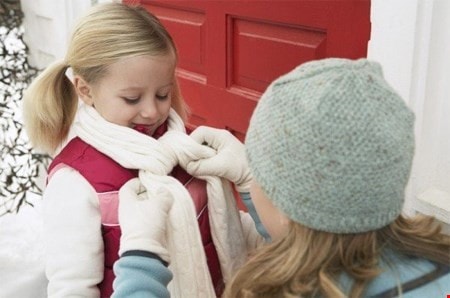Seven ways to keep your baby healthy in cold weather
During the winter, the American Academy of Pediatrics has come up with some of the best tips to keep your child healthy.
1. Dress warmly
Children need to be dressed warmly when outdoors, preferably in layers to keep them dry and warm. Don’t forget shoes, gloves or mittens, and hats.
Children should wear at least one more layer of clothing than adults in the same temperature conditions. Children in cars should wear a thin layer of clothing, not too thick. For young children, do not use too many blankets, pillows, and sheets on the bed when sleeping because they have caused many deaths in children. It is best to use warm pajamas or blankets that can be wrapped around the child. If you use a blanket, you should only use a thin blanket and tuck the edge under the mattress, so that the blanket only reaches the child's chest to avoid covering the child's face.
 |
| In winter, children must be kept warm properly to avoid getting sick. |
2. Hypothermia
Hypothermia occurs when a child’s body temperature drops below normal due to being in the cold for too long or wearing wet clothes. When a child has hypothermia, he or she will shiver, become lethargic, and become clumsy. The child will also slur his or her speech, and in some cases the temperature will drop to a more severe level.
As soon as you see your child has hypothermia, you should take him to the emergency room. Before going to the hospital, you should change wet clothes and wrap him in a blanket or warm clothes.
3. Frostbite
Frostbite occurs when the skin and outer tissues freeze. This can occur on the fingers, toes, ears, and nose. Children may also complain of frozen, burned skin.
If your child has frostbite, take him or her indoors and place the affected part of the body in warm (not hot) water. The skin may be discolored, gray, or dry. You can also place a warm towel on the child's nose, ears, or lips that are frostbitten. Do not rub the frozen skin. After a few minutes, dry the child and dress him or her in warm clothing, wrap him or her in a blanket, and give him or her warm water to drink. If the numbness does not subside after a few minutes, you should see a doctor.
4. Winter diseases
If your child has nosebleeds in the winter, consider using a humidifier in the bedroom at night. Nasal drops can also help keep nasal tissues moist. If your child has severe nosebleeds, see a doctor.
Many doctors recommend that babies under one year of age should only be bathed two to three times a week. Too much bathing can dry out the skin.
Cold weather does not cause colds, but viruses are common in winter, especially when children are in school. Teach your child to wash his or her hands and to cough and sneeze into the back of his or her hand to avoid spreading the disease. Children over six months can be vaccinated.
5. Outdoor activities
You should limit your child's outdoor play time to avoid hypothermia and frostbite. Do not give your child medication or alcohol before going outside to play.
6. Sun protection
Sunburn can still occur in winter, especially when reflected off snow. Sunscreen and sunglasses should be used on children.
7. Avoid fire accidents
Winter is also a time of many fire accidents. You should buy smoke detectors for your home and teach your children the skills needed in case of fire. Keep heaters and stoves at least 1 meter away from any flammable objects and turn them off when leaving the room./.
According to VOV.VN
| RELATED NEWS |
|---|


